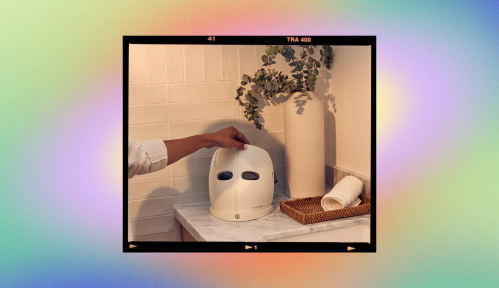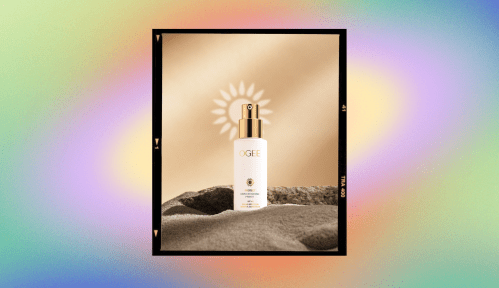Can’t Smell Your Favorite Perfume Anymore? ‘Olfactory Adaptation’ Is To Blame
If you've found yourself wondering, "why can't I smell my perfume?" experts say something called "olfactory adaptation" is to blame.

Although finding your signature scent can take months (if not years), there’s a certain satisfaction that comes once you land on a fragrance that perfectly embodies you. Friends and colleagues recognize it as your trademark, strangers in the elevator inquire about the brand, and you can rest easy knowing that you always smell superb. But then, one day you wake up and spritz on your go-to juice only to realize… it doesn’t smell like anything at all anymore. Has the bottle gone bad? Is your nose feeling particularly uncooperative? Nope. Your newly discovered nose blindness is likely due to a finicky process known as olfactory adaptation.
What’s the deal with olfactory adaptation?
Your nose and brain are connected through a complex system of olfactory receptors and chemical reactions, which explains why scent has the power to trigger memories and other psychological and physiological reactions. But, “there are still studies going on to fully understand that connection,” says Linda Song, a leading perfumer at Givaudan.
What we do know, though, is that this link is much stronger than the one between your brain and your other senses. And when your nose is overexposed to a certain scent, “There is a long-term period of recovery with smell that doesn’t seem to happen with hearing or vision,” says Pamela Dalton, PhD, MPH, a cognitive psychologist at The Monell Center, a non-profit institute that researches taste and smell.
For proof of this concept, she points to an experiment during which people were exposed to a scent while they were sleeping for two weeks. After the smell was removed, it took another two weeks for participants to become as sensitive to it as they were at the start of the process. So if you’re frequently smelling a particular scent—your perfume, your apartment’s perma-smell, your cat’s litter box—you can eventually develop olfactory adaptation to it.
What’s going on inside my head?
Scent molecules may enter through your nose, but the way you perceive them is a far more complicated process.
“There is a chemical response when those single organic molecules are isolated in the nose and received on those olfactory receptors,” says Song. “That chemical response then triggers an electrical response to our brain, which goes to the prefrontal cortex.” It’s no accident that this area is also associated with memories and emotions, which is why certain scents can trigger such a powerful response.
However, Dalton explains that the olfactory system is designed to detect changes. “So if you’re using a scent all the time, not only are your receptors going to be less sensitive, but your brain is going to say ‘I don’t need to pay attention to this anymore,” she says.
In other words, if a scent is constantly wafting in the background—whether it’s a personal fragrance on your body or something in the room around you—your brain will essentially become so accustomed to it that it won’t register anymore.
Additionally, just as we’re all accustomed to the idea of worsening vision and hearing as we get older, our senses of smell are also susceptible to age-related changes. “You have optimal scent sensitivity in your teens and twenties,” says Dalton. “There are changes that occur after that, but you don’t really start to see a drop off until you get to post-50. You can’t change that [since] it’s a biological process.”
Additionally, certain lifestyle choices like smoking can decrease your sensitivity to odors (yet another reason to kick the habit) and prolonged diseases, such as chronic sinusitis, can potentially impact your sense of smell. Both Song and Dalton explain that although there is suspicion that living in heavily polluted areas might cause olfactory issues, there is currently a lack of research on how this might happen or how to correct it.
With that in mind, there’s a case to be made for regularly “exercising” your sense of smell to combat both this inevitable olfactory decline and your body’s adaptation to certain scents.
Training your sense of smell
Both Song and Dalton reveal that people in professions that require an astute nose, like a chef or perfumer, are capable of retaining their senses of smell well into their 70s and 80s.
“It is very much like detailed patterning,” says Song. “Because of the electrical transmission to the brain, we’re creating more detailed patterns of how we’re perceiving these scents. So, the more you know and experience different smells, the more that you’re able to detail exactly what a scent is.” She explains that this contextuality explains why perfumers can detect a difference between specific raw materials, like a rose absolute versus a rose essential oil, while the average consumer cannot.
Even if you don’t aspire to have a scent-adjacent career, though, Song recommends becoming more active in the way you interact with scent to stave off olfactory adaptation and decline. “Scent is the most primitive form of our senses, and you’re always able to perceive smell, even if you don’t necessarily want to,” she says. “But if you’re actively thinking about it, then you’re creating a connection between what you’re smelling and then remembering it for next time.”
Since scent involves actual physical molecules (as opposed to light or sound waves), Dalton explains that it’s important to remove the actual molecules from your receptors in order to become sensitive to them again—and there are a few different ways you can do this.
The first, Dalton says, is getting your blood flowing. “Some of the molecules will partition into the blood via little capillaries in the nose, so increasing blood flow can flush them out,” she explains, adding that she knows some perfumers who will run up and down a flight of stairs during their workday to keep their noses clear. This method is particularly helpful with musk, amber, and woody scents, which Song says are more prone to olfactory adaptation (possibly due to their larger molecule size, but the research is still lacking to confirm this hypothesis).
The other way you can clear your scent molecules is simply by exhaling them out or swallowing the mucus that moves through the olfactory region (which is gross, but effective). So, if you think your fragrance is fading, try spritzing it on after an intense workout—the elevated heart rate and heavy breathing that come with a sweat sesh will clear your olfactory receptors so you can smell it more clearly.
Most importantly, remember that while you might not think your favorite fragrance smells like anything anymore, or it’s not as strong as you remember, that’s likely not true for the people in close proximity to you. As Dalong cautions, “Recognize that, yes, a fragrance will diminish over time, but it’s not going to diminish for everyone else as fast as it’s going to weaken for you.” So if you ever feel the urge to bathe in your go-to perfume, exercise caution for the sake of your friends’ and neighbors’ noses and trust that you do still smell really, really good.
Sign up for the Well+Good SHOP Newsletter
Get exclusive deals on wellness, beauty, fitness, and food products that have been hand-picked by our editors.
Got it, you've been added to our email list.










